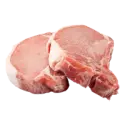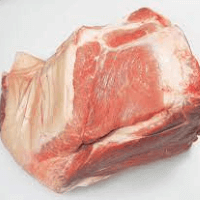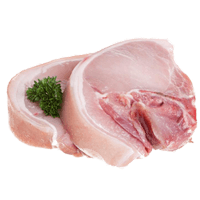Pork, fresh, loin, blade (chops), bone-in, separable lean only, cooked, pan-fried nutrition: calories, carbs, GI, protein, fiber, fats
*all the values are displayed for the amount of 100 grams
Top nutrition facts for Pork, fresh, loin, blade (chops), bone-in, separable lean only, cooked, pan-fried

| Calories ⓘ Calories for selected serving | 222 kcal |
| Net Carbs ⓘ Net Carbs = Total Carbohydrates – Fiber – Sugar Alcohols | 0 grams |
| Acidity (Based on PRAL) ⓘ PRAL (Potential renal acid load) is calculated using a formula. On the PRAL scale the higher the positive value, the more is the acidifying effect on the body. The lower the negative value, the higher the alkalinity of the food. 0 is neutral. | 13.5 (acidic) |
Protein ⓘHigher in Protein content than 90% of foods
Vitamin B3 ⓘHigher in Vitamin B3 content than 86% of foods
Vitamin B1 ⓘHigher in Vitamin B1 content than 82% of foods
Cholesterol ⓘHigher in Cholesterol content than 80% of foods
Vitamin B2 ⓘHigher in Vitamin B2 content than 79% of foods
Pork, fresh, loin, blade (chops), bone-in, separable lean only, cooked, pan-fried calories (kcal)
| Calories for different serving sizes of pork, fresh, loin, blade (chops), bone-in, separable lean only, cooked, pan-fried | Calories | Weight |
|---|---|---|
| Calories in 100 grams | 222 | |
| Calories in 3 oz | 189 | 85 g |
| Calories in 1 chop | 477 | 215 g |
Extra Nutrition facts for Pork, fresh, loin, blade (chops), bone-in, separable lean only, cooked, pan-fried
| Protein per 100 calories ⓘ Shows how many grams of protein you get from 100 calories of this food, calculated as (protein in g ÷ calories) × 100. | 12 g |
| Calories per 10 g protein ⓘ Shows how many calories you need to eat from this food to get 10 g of protein, calculated as (calories ÷ protein in g) × 10. | 84 kcal |
Mineral coverage chart
Mineral chart - relative view
Vitamin coverage chart
Vitamin A:
9µg of 900µg
1%
Vitamin E:
0.66mg of 15mg
4.4%
Vitamin D:
1.8µg of 20µg
9%
Vitamin C:
0mg of 90mg
0%
Vitamin B1:
1.5mg of 1mg
127%
Vitamin B2:
1.1mg of 1mg
81%
Vitamin B3:
26mg of 16mg
162%
Vitamin B5:
3.6mg of 5mg
73%
Vitamin B6:
1.5mg of 1mg
116%
Folate:
0µg of 400µg
0%
Vitamin B12:
2.2µg of 2µg
90%
Vitamin K:
0µg of 120µg
0%
Vitamin chart - relative view
Macronutrients chart
Protein:
Daily Value: 53%
26.4 g of 50 g
26.4 g (53% of DV )
Fats:
Daily Value: 19%
12.1 g of 65 g
12.1 g (19% of DV )
Carbs:
Daily Value: 0%
0 g of 300 g
0 g (0% of DV )
Water:
Daily Value: 3%
61.1 g of 2,000 g
61.1 g (3% of DV )
Other:
0.4 g
0.4 g
Protein quality breakdown
Tryptophan:
918mg of 280mg
328%
Threonine:
3390mg of 1,050mg
323%
Isoleucine:
3651mg of 1,400mg
261%
Leucine:
6345mg of 2,730mg
232%
Lysine:
6855mg of 2,100mg
326%
Methionine:
2112mg of 1,050mg
201%
Phenylalanine:
3204mg of 1,750mg
183%
Valine:
3900mg of 1,820mg
214%
Histidine:
3135mg of 700mg
448%
Fat type information
Saturated fat:
2.6 g
Monounsaturated fat:
5.7 g
Polyunsaturated fat:
1.1 g
All nutrients for Pork, fresh, loin, blade (chops), bone-in, separable lean only, cooked, pan-fried per 100g
| Nutrient | Value | DV% | In TOP % of foods | Comparison |
| Vitamin A | 3µg | 0% | 62% | |
| Calories | 222kcal | 11% | 43% |
4.7 times more than Orange
|
| Protein per 100 calories | 12g | N/A | 21% | |
| Calories per 10 g protein | 84kcal | N/A | 25% | |
| Protein | 26g | 63% | 10% |
9.4 times more than Broccoli
|
| Fats | 12g | 19% | 28% |
2.7 times less than Cheese
|
| Vitamin C | 0mg | 0% | 100% |
N/A
|
| Net carbs | 0g | N/A | 75% |
N/A
|
| Carbs | 0g | 0% | 100% |
N/A
|
| Cholesterol | 82mg | 27% | 20% |
4.5 times less than Egg
|
| Vitamin D | 0.6µg | 6% | 47% |
3.7 times less than Egg
|
| Magnesium | 21mg | 5% | 57% |
6.7 times less than Almonds
|
| Calcium | 46mg | 5% | 35% |
2.7 times less than Milk
|
| Potassium | 335mg | 10% | 29% |
2.3 times more than Cucumber
|
| Iron | 0.88mg | 11% | 64% |
3 times less than Beef broiled
|
| Sugar | 0g | N/A | 100% |
N/A
|
| Fiber | 0g | 0% | 100% |
N/A
|
| Copper | 0.11mg | 12% | 50% |
1.4 times less than Shiitake
|
| Zinc | 3mg | 28% | 30% |
2.1 times less than Beef broiled
|
| Phosphorus | 237mg | 34% | 25% |
1.3 times more than Chicken meat
|
| Sodium | 88mg | 4% | 50% |
5.6 times less than White bread
|
| Vitamin E | 0.22mg | 1% | 74% |
6.6 times less than Kiwi
|
| Manganese | 0.01mg | 1% | 87% | |
| Selenium | 39µg | 70% | 25% | |
| Vitamin B1 | 0.51mg | 42% | 18% |
1.9 times more than Pea raw
|
| Vitamin B2 | 0.35mg | 27% | 21% |
2.7 times more than Avocado
|
| Vitamin B3 | 8.6mg | 54% | 14% |
1.1 times less than Turkey meat
|
| Vitamin B5 | 1.2mg | 24% | 32% |
1.1 times more than Sunflower seeds
|
| Vitamin B6 | 0.5mg | 39% | 25% |
4.2 times more than Oats
|
| Vitamin B12 | 0.72µg | 30% | 44% |
Equal to Pork
|
| Vitamin K | 0µg | 0% | 100% |
N/A
|
| Trans fat | 0.03g | N/A | 69% |
595.6 times less than Margarine
|
| Folate | 0µg | 0% | 100% |
N/A
|
| Choline | 85mg | 15% | 55% | |
| Saturated fat | 2.6g | 13% | 42% |
2.3 times less than Beef broiled
|
| Monounsaturated fat | 5.7g | N/A | 28% |
1.7 times less than Avocado
|
| Polyunsaturated fat | 1.1g | N/A | 44% |
43.7 times less than Walnut
|
| Tryptophan | 0.31mg | 0% | 49% |
Equal to Chicken meat
|
| Threonine | 1.1mg | 0% | 51% |
1.6 times more than Beef broiled
|
| Isoleucine | 1.2mg | 0% | 51% |
1.3 times more than Salmon raw
|
| Leucine | 2.1mg | 0% | 51% |
1.1 times less than Tuna Bluefin
|
| Lysine | 2.3mg | 0% | 51% |
5.1 times more than Tofu
|
| Methionine | 0.7mg | 0% | 51% |
7.3 times more than Quinoa
|
| Phenylalanine | 1.1mg | 0% | 52% |
1.6 times more than Egg
|
| Valine | 1.3mg | 0% | 52% |
1.6 times less than Soybean raw
|
| Histidine | 1mg | 0% | 46% |
1.4 times more than Turkey meat
|
| Caffeine | 0mg | 0% | 100% | |
| Omega-3 - EPA | 0g | N/A | 100% |
N/A
|
| Omega-3 - DHA | 0g | N/A | 100% |
N/A
|
| Omega-3 - ALA | 0.03g | N/A | 91% |
285.6 times less than Canola oil
|
| Omega-3 - DPA | 0.01g | N/A | 45% |
18.9 times less than Salmon
|
| Omega-6 - Gamma-linoleic acid | 0g | N/A | 89% | |
| Omega-6 - Eicosadienoic acid | 0.03g | N/A | 74% |
Check out similar food or compare with current
NUTRITION FACTS LABEL
Nutrition Facts
___servings per container
Serving Size ______________
Serving Size ______________
Amount Per 100g
Calories 222
% Daily Value*
19%
Total Fat
12g
12%
Saturated Fat 2.6g
0
Trans Fat
0g
27%
Cholesterol 82mg
3.8%
Sodium 88mg
0
Total Carbohydrate
0g
0
Dietary Fiber
0g
Total Sugars 0g
Includes ? g Added Sugars
Protein
26g
Vitamin D
23mcg
2.9%
Calcium
46mg
4.6%
Iron
0.88mg
11%
Potassium
335mg
9.9%
*
The % Daily Value (DV) tells you how much a nutrient in a serving of food contributes to a daily diet. 2,000 calories a day is used for general nutrition advice.
Health checks
ⓘ
Dietary cholesterol is not associated with an increased risk of coronary heart disease in healthy individuals. However, dietary cholesterol is common in foods that are high in harmful saturated fats.
Source
Low in Cholesterol
ⓘ
Trans fat consumption increases the risk of cardiovascular disease and mortality by negatively affecting blood lipid levels.
Source
No Trans Fats
ⓘ
Saturated fat intake can raise total cholesterol and LDL (low-density lipoprotein) levels, leading to an increased risk of atherosclerosis. Dietary guidelines recommend limiting saturated fats to under 10% of calories a day.
Source
Low in Saturated Fats
ⓘ
While the consumption of moderate amounts of added sugars is not detrimental to health, an excessive intake can increase the risk of obesity, and therefore, diabetes.
Source
Low in Sugars
References
All the values for which the sources are not specified explicitly are taken from FDA’s Food Central. The exact link to the food presented on this page can be found below.


